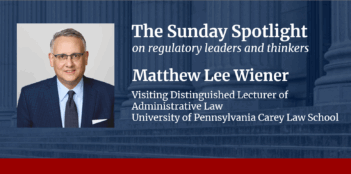
Penn Law students learn about adjudication and regional enforcement of regulations.
References to regulation are often associated with Washington, D.C., conjuring visions of large, federal buildings full of bureaucrats writing myriad pages of rules. But that is only one aspect of regulation—and it ignores a major part of the picture. Federal regulations are only effective if they are enforced around the country and if disputes arising under them are properly adjudicated. In reality, much of regulation plays out at the local level, in your state and town or city.
As part of a new policy research seminar taught by Professor Cary Coglianese at the University of Pennsylvania Law School, students focused last year on how best to improve the administrative state by engaging in a day of discussions with several of the oft-overlooked regulators: those in regional offices charged with enforcing and adjudicating regulations that come out of Washington.
The morning was spent with two administrative law judges, who spoke about their experiences presiding over adjudications for the U.S. Social Security Administration (SSA) and the U.S. Department of Labor. Administrative law judges may not be familiar to many people, but they play a critical role in the administration of regulations and government programs.
Take the Social Security disability benefits context, for example. When a staff member at the SSA denies someone disability benefits, and denies them again after reconsideration, the person claiming benefits can request a hearing before an administrative law judge.
These hearings are unlike other court proceedings. They are not adversarial. Instead, the administrative law judge, who is appointed and employed by the agency itself, serves as the judge, but is also the only agency employee present for the hearing. The person seeking benefits will be present, but is not necessarily represented by an attorney or another, non-lawyer advocate.
With roughly 1,400 administrative law judges, the SSA employs more of these adjudicators than all other federal agencies combined. Yet these judges still face an enormous task. Administrative law judges hearing social security disability benefits cases often lack any medical education, yet they are called upon daily to determine whether complex health conditions render a person unable to work. Claims of mental health problems that prevent an individual from working raise particular challenges for adjudicators.
The SSA’s administrative law judges hear almost 800,000 cases in a year altogether, and a growing back log of cases waiting for hearings creates pressure for them to hear even more. That level of workload affords each judge relatively little time to preside over the hearings, and to make decisions with momentous impact on each claimant’s eligibility for benefits.
Consistency and accuracy of the benefits determinations among administrative law judges are considerable concerns, particularly given the vast numbers of cases heard each year. However, a recent recommendation from the Administrative Conference of the United States, aimed at increasing the consistency and accuracy of benefits determinations, found evidence “that claims are being resolved in an inconsistent, if not inaccurate, manner.”
Administrative law judges have faced criticism by political leaders and advocates on both sides of the ideological divide. Claimants’ rights advocates question the sufficiency of the due process provided when the judge is an agency employee. Meanwhile, fiscally-minded critics of the growing cost of the Social Security benefits program protest certain administrative law judges’ high rate of granting benefits.
Part of the reason for these criticisms stems from the important role that adjudicating claims fills in a national administrative program. In a similar way, the work done by regionally-based agency staff in enforcing regulations plays an equally important role within the federal regulatory system. Enforcement ensures that regulations achieve the impact intended by the rules’ authors.
To gain insight into the process of regulatory enforcement, students in the Penn Law seminar spent the afternoon meeting with staff members in the U.S. Environmental Protection Agency’s (EPA) Office of Regional Counsel, which is responsible for enforcing the EPA’s regulations throughout the Mid-Atlantic region.
A small group of dedicated enforcement attorneys spoke to the students about the difficulty of enforcing frequently complex, environmental regulations across large territories and with limited resources. When an agency lacks the bandwidth to catch all violations, they explained, enforcement staff members have to make tough choices about which violators to go after. Such decisions become increasingly common, and difficult, in the face of further tightening of the EPA’s budget.
One plan that the EPA has worked to develop to increase the effectiveness of its enforcement efforts is called the Next Generation Compliance Program. The program, dubbed “Next Gen” for short, takes an integrated approach to increasing compliance with regulations. In addition to emphasizing the need to make regulations clearer and easier to comply with from the start and incorporating innovative technologies to aid in monitoring and reporting, Next Gen focuses on “innovative enforcement approaches.”
One of these approaches involves the monitoring of electronically reported compliance data. Enforcement officials, like those in EPA’s regional office in Philadelphia, monitor electronic information diligently and then use it to decide which violations to pursue.
Although the final word is still out on Next Gen’s ultimate success in bolstering the EPA’s enforcement capacity, the program’s existence demonstrates the agency’s continuing interest in keeping pace with modern innovation.
Law students often learn in detail about the rulemaking process that takes place in different agencies’ headquarters in Washington, D.C., but they seldom are exposed to the vital tasks that these agencies must undertake in the field after policy gets made in Washington. Through Professor Coglianese’s policy research seminar, Penn Law students who will soon be practitioners, and some of whom eventually will be policymakers, benefited from a full day of learning from those who have experienced firsthand the challenges of applying regulation in real life.
The policy research seminar, entitled Reforming the Administrative State, was supported by Penn Law’s Model Government and Public Affairs Initiative.



